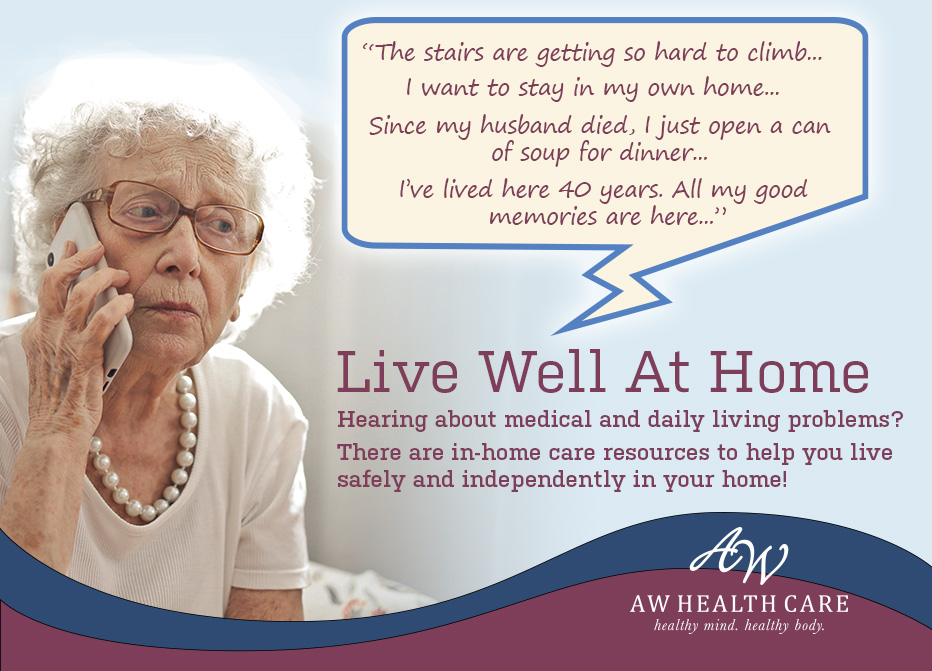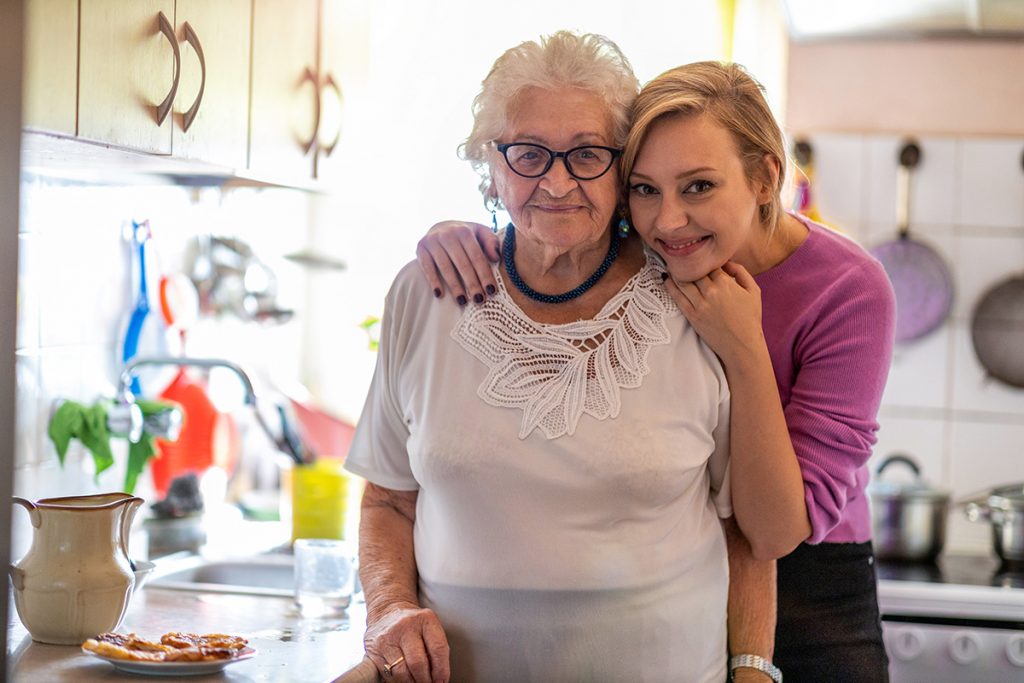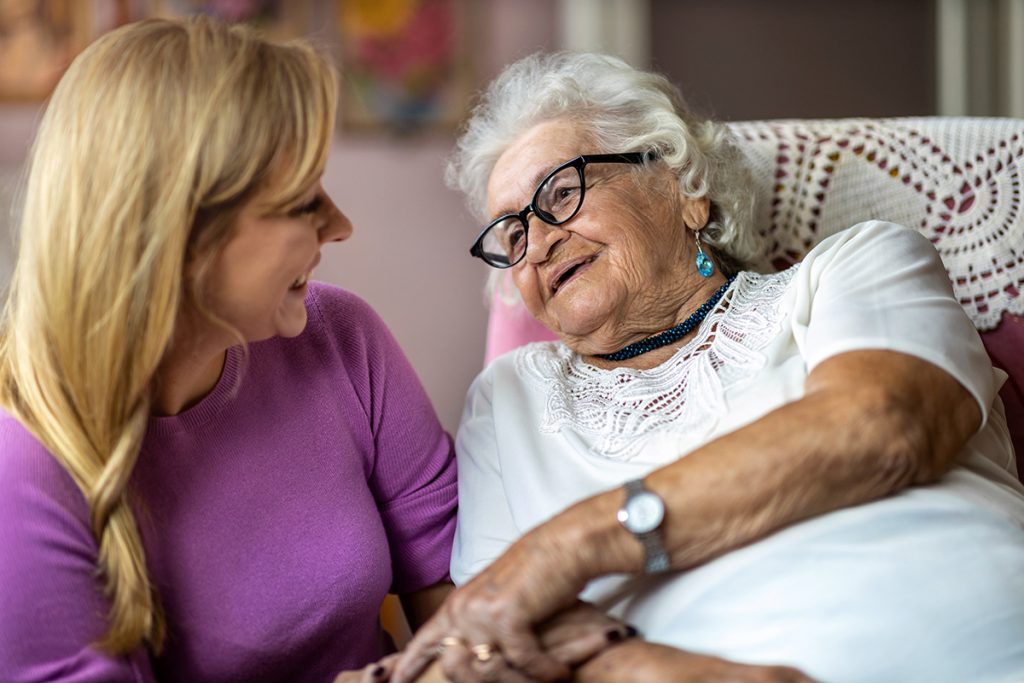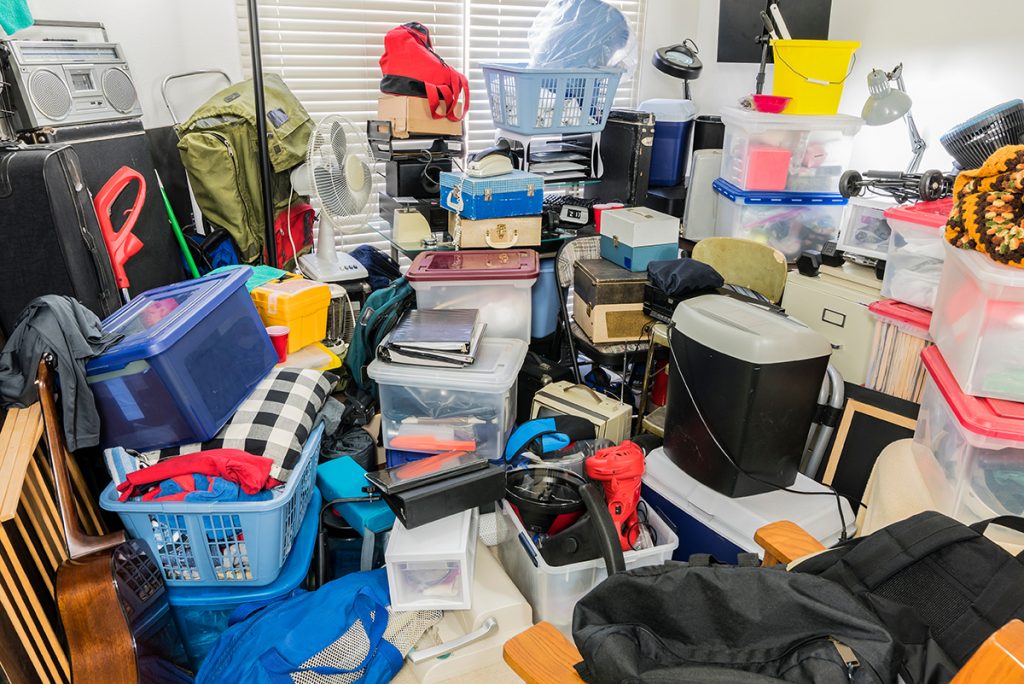In Home Care Resources
We all are getting older. You cannot avoid it. As you age, things change. You may hear common complaints from friends who need care about aging at home. You recognize that with age, living at home is challenging.
Everyone wants to remain living in their home for as long as possible. If you have a chronic health condition, or have problems with daily living, there are solutions to help you live safely and independently.
Home Healthcare
Home healthcare is medical care provided by a licensed professional in your home. If you have recently had a fall, been in the hospital or rehab, are living with a chronic condition or experiencing general decline, you may benefit from home healthcare. You can receive medical and therapy care in your home which can help you recover faster and better. Insurance covers home healthcare and is prescribed by a doctor.
Home Care
For many years you took care of all your daily living activities. But now things are becoming more difficult to handle. This often happens due to cognitive decline or general aging. You can benefit from just a few hours per week or daily care. This care includes such things as personal care, meal prep and light chores. Or you may need someone to take you shopping or to doctor appointments.
Home care services are paid by you. Some non-profit agencies may have funds available if you qualify. There may be benefits available to you if you are a veteran or a veteran’s spouse. If you are Medicaid or Medicaid eligible and qualify, the State of Missouri may cover the cost of your in-home care.
In this issue of Aging Well, we will learn more about in-home care options and how these services can help you be more independent, comfortable and safe and “age well” too!
Home Health Is An Important Medical Service
Hospitalization is not needed to receive home healthcare.
Home healthcare provides comprehensive support for patients with chronic diseases and post-acute care needs.
A licensed professional provides home healthcare in the home. It is commonly part of a patient recovery plan after illness, injury or decline and is prescribed by a doctor.
Your health insurance covers home healthcare expenses, but benefits vary by plan. Home healthcare is usually started after a hospitalization, rehab stay, physical decline, medication change, new diagnosis or after an injury or fall.
The home health agency nurse works with your doctor to assure services are delivered quickly and keeps your doctor informed of your progress during recovery.
Common Skilled Services
- Administration of prescription medications or injections
- Medical tests
- Monitoring of health status
- Wound care/catheter care/ostomy care
- IV services
- Physical/occupational/speech therapy
- Home health aides
- Medical social services
When Is Home Healthcare Prescribed?
Home healthcare may also be prescribed in other circumstances. Suppose you had a fall in your apartment. Maybe you became ill with a new diagnosis. Possibly you have suffered a severe bout of the flu or dehydration. Or maybe you’re not feeling quite right because of a new medication. Something as simple as general decline in one’s health and ability to be independent can also trigger the need for home health.
You may benefit from home healthcare if you have…
- Been discharged recently from rehabilitation or from a hospital.
- Had a medication change and are experiencing new side effects.
- Are not able to safely travel to and from doctor appointments.
- Experienced an overall decline in function and want to regain independence
Need Help With Daily Living?
People’s needs vary depending on age or level of infirmity. People may need home care for just a few hours per week or 24-hour care. Many agencies have minimum hourly requirements. Aides are trained to understand the nuances of caring for seniors and the disabled. Aides are generally not licensed to provide medical services.
Home care services may include:
- Companionship – reading aloud, chatting and in-home hobbies and activities
- Transportation to appointments, errands and shopping
- Assistance with activities of daily living (ADLs) like dressing, bathing, toileting and grooming
- Well-being checks
- Wake-up or tuck-in assistance
- Meal preparation or delivery
- Cleaning and organizing
- Help with bills and financial management
- Caregiver respite
Home care may also include these services:
- Professional Geriatric Care Management: Helps families assess their long-term care options and develops a workable plan.
- Medical Social Work Services: Family and individual assessment and counseling
- Some skilled services and nursing oversight
Who pays for Home Care?
Private pay, Medicaid, long term care insurance or Veterans’ benefits pays for home care costs. Some agencies have relationships with non-profit groups who can help pay for the cost of home care.
How do I know when someone needs care at home?
Here are some common indicators:
- Forgotten medications or double-dosing
- Missed doctor appointments
- Neglect of proper bathing, dressing or use of the toilet
- Difficulty getting out to shop, purchase food and prepare meals
- Trouble reading mail, managing a check book and paying bills
Consumer Directed Services
Through the Missouri Consumer Directed Services (CDS) Program, Medicaid beneficiaries who qualify can choose their own caregiver to provide services like bathing, housekeeping, meal preparation and transportation.
Expenses are covered by MO HealthNet. Home care agencies will often be able to help clients learn if they qualify and help them get their care started. More information? Contact 314 726-5600 x494
Facts About Hoarding
- About 5% adults have hoarding disorder.
- Runs in families.
- Affects women more than men.
Why do people hoard?
- Sentimental attachment – “If I throw away this sea shell, I will not remember my trip to the beach last year.”
- Specific Self-identity – “I pride myself on my cooking skills, so I need to keep all these utensils, pots and pans even though I don’t use them.”
- There’s usefulness in everything – “It’s wasteful to throw out these old shoelaces because I know I’ll need them for something later.”
Hoarding Dangers
- Collects dust, leading to COPD and other respiratory issues
- Blocks hallways and stairs, hampering mobility and leading to falls
- Encourages bug and rodent infestations
- Becomes a fire hazard
- Takes an emotional toll on families and friends
Help for Hoarders
Often hoarders do not realize they have a problem. Cognitive behavioral therapy (CBT) to help the person better understand why he or she is hoarding, and to improve decision making, organizational, and problem-solving skills. CBT can be done one-on-one with a therapist, or in a group or workshop setting.
Downsizing Help for Pack Rats
Even many of us who aren’t true hoarders could do with a little downsizing. Set aside time on a regular basis—20 or 30 minutes—to go through and clean out your “stuff”.
Sort items into one of three categories:
- I’m definitely going to keep this item.
- I’m definitely going to throw away or give away this item.
- I’m not sure.
Follow Through
- Put all the “keepers” in a designated place
- Get rid of the “throw aways” as soon as possible.
- With the unsure pile, ask yourself some simple questions like:
- Do I really need this?
- Am I going to use this?
- How often have I used this?
- Could I get something like this again if I need it?
Once you have an organizational system in place, you can distinguish better between what you need and what you want. That way, cleaning house becomes easier without making you feel overwhelmed.













Comments are closed.